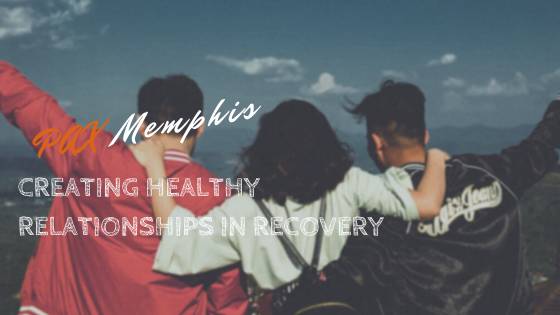Healthy relationships are a necessary component of living a happy, healthy life. Relationships give our lives meaning and lead to an array of emotions from great joy to great sorrow. Most people have important relationships with people they love, friends, colleagues, and even within their workplace. However, many individuals struggling with addiction often engage in unhealthy, toxic relationships. These relationships create feelings of stress, frustration, and conflict. In addition, engaging in these kinds of relationships perpetuate the cycle of addiction. Therefore, it is important for individuals in recovery to establish healthy relationships that support a sober lifestyle.
The Importance of Establishing Healthy Relationships in Recovery
One of the key components to living a happy life is establishing healthy relationships. In recovery, individuals must work to establish health and wellness in every area of their lives in order to maintain their sobriety. This includes how each person interacts with the world around them, and how they approach relationships with themselves and others. Healthy relationships in recovery include reciprocal support, comfort, and respect. Healthy relationships generally include common values such as:
- Mutual respect
- Mutual thoughtfulness
- Honesty
- Trust
- Effort
- Support/Encouragement
- Humor/Playfulness
- Security/Safety
- Compassion
- Consideration
- Maintain healthy boundaries
- Supports recovery, not addiction
- Involves healthy communication
- Centers on mutual health/wellness of each individual
Healthy relationships in recovery require boundaries in order to avoid codependency. Most alcoholics and addicts participate in codependent relationships before getting sober because these types of toxic relationships serve the addicted individual and their substance use disorder. Before a recovering individual can establish healthy relationships with others, he/she must have a healthy relationship with themselves.
Establishing a Healthy Relationship With Yourself in Recovery
There is not a relationship more important than the relationship you have with yourself. When an individual has struggled with an addiction to alcohol or drugs like heroin, methamphetamines, or prescription painkillers, he/she often has an unhealthy relationship with themselves. In active addiction, an individual is abusing his/her body and often engages in behaviors that bring about feelings of guilt and shame. Before a person can establish healthy relationships with others, they must cultivate a healthy relationship with themselves.
Recovery encompasses a lifestyle that centers around healing and learning to love yourself. Establishing a healthy lifestyle requires individuals to develop self-love through practicing self-care and letting go of past mistakes. Here are a few tips for developing a healthy relationship with yourself in recovery:
- Cease all negative self-talk
- Practice positive affirmations
- Maintain your sobriety
- Set goals
- Surround yourself with positive, supportive individuals
- Forgive yourself and move forward
- Participate in activities that make you feel good about yourself (exercising, joining a 12-Step Fellowship, meditation)
Once you have begun establishing a healthy relationship with yourself, it will be much easier to identify unhealthy patterns of behaviors within yourself and others.
Identifying Unhealthy Relationships
Unhealthy or toxic relationships cultivate damaging and chaotic dynamics. Toxic relationships inevitably lead to toxic behaviors from both partners – especially for those in recovery. Ultimately, unhealthy relationships lead to relapse which is why it is important to understand the warning signs of an unhealthy relationship.
- Manipulation
- Selfishness
- Gas-lighting
- Mental Abuse
- Physical Abuse
- Blame-shifting
- Contempt
- Obligation
- Codependency
- Verbal Abuse
- Financial Abuse
- Lack of respect
- Invasion of privacy
- Lack of boundaries
- Controlling Behaviors
- Avoidant Behaviors
- Lack of communication
- Exclusion
- Shaming
- Invalidation
- Lack of time/consideration for the partner
- Lack of reciprocal support
Relationships that exhibit these specific qualities often lead to feelings of depression, anxiety, and overall frustration. Individuals participating in unhealthy relationships also experience extreme stress and may attempt to cope by abusing substances to escape unwanted feelings. For individuals who suffer from a pre-existing mental health disorder such as depression, bipolar disorder, anxiety, or substance use disorder, unhealthy relationships exacerbate these symptoms.
12-Step Support Groups and Healthy Relationships in Recovery
Individuals who actively participate in 12-Step programs can cultivate new, healthy relationships in recovery that implement hope, support, and overall positivity. 12-Step groups build community and a common bond amongst individuals who are recovering from the throes of addiction. These groups offer a safe, supportive environment for individuals to connect on an intimate level as they share the painful experiences of their past addictions and offer the hope of a common solution of recovery. 12-Step support groups lay the foundation for sober individuals to learn how to establish healthy relationships in recovery.
12-Step programs provide participants with a spiritual way of life as well as emotional support and a foundation for establishing healthy, harmonious relationships. In addition, they encourage members to do service by helping others. As an altruistic way of life, many people in recovery find purpose and belonging in 12 step fellowships.
Addiction is a complex mental health disorder that affects the mind, body, and overall wellbeing of an individual. Recovery, on the other hand, is an ever-evolving process. There is no cure for addiction and recovery is more than completing 30-90 days at an addiction treatment center. Instead, recovery requires ongoing care, support, and behavioral changes such as establishing healthy relationships in recovery and cultivating an overall healthy lifestyle.
Medically Reviewed: September 25, 2019

All of the information on this page has been reviewed and verified by a certified addiction professional.










